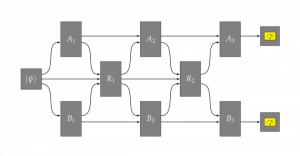Summary
Classical game theory – conducted at the interface between economics and computer science – has found applications in topics ranging from networking and security to online markets. Despite over 20 years of research into connections between game theory and quantum information, we have yet to see any significant implications of quantum information when applied to game theory. This project brings a reformulation of quantum game theory as a mathematical theory of strategic interactions involving quantum information among rational decision-making agents. We focus on computational complexity aspects as a means to redevelop quantum game theory and tackle four challenge areas that include non-interactive games, interactive games, correlated (and entangled) equilibria, and cooperative quantum strategies. This reformulation of quantum game theory holds promise for enabling new mathematical techniques in quantum information science (e.g., communication protocols) and new applications of quantum devices. Finally, as we consider the fundamental aspects of quantum games, we are bound to discover interesting new mathematical structures that may find uses in other areas of quantum information science.

Figure 1. An illustration of a multiple-turn, abstract game involving three agents who exchange and process quantum information.
Related Content
Line-Scanning optical coherence tomography system for in-vivo, non-invasive imaging of the cellular structure and blood perfusion of biological tissue
Summary Optical coherence tomography (OCT) is an optical imaging method that allows for in-vivo, non-invasive imaging of the structure and vasculature of biological tissue. Commercially available, clinical OCT systems utilize point-scanning method to acquire volumetric images over a large surface with typical frame rates of ~ 30 frames/ second. Since living biological tissue is constantly […]
August 27, 2019
Quantum Sensing Applications using Quantum Communication Technology
Summary The Quantum Encryption and Science Satellite provides a platform to develop and deploy quantum sensing and metrology via photonic channels. This project will build upon ‘free-space’ quantum communication technology and explore new approaches and methods to advance two primary applications: quantum-enhanced telescopes, and spectroscopic sensing for methane detection in the atmosphere. For the […]
December 8, 2018

Next Generation Quantum Sensors
We are developing new semiconductor p-n junctions and designing novel nanowire arrays that have the potential to significantly enhance the ability to detect light at the single photon level over an unprecedented wavelength range from the ultraviolet to infrared.
June 1, 2017

Combined momentum- and real-space photoelectric probes of dimensionality-tuned Weyl semimetals
Summary The library of two-dimensional (2D) materials has recently grown to include topological insulators and semimetals. Their incorporation in special device geometries may lead to novel quantum electronics with enhanced functionalities. Weyl semimetals, in particular, offer the most robust form of topological protection. Recent results from our group indicate that Weyl nodes should be […]
March 12, 2019

